The Walking Dead S8E08: How It’s Gotta Be
The very general but nearly always followed rule of thumb of this show is that the moment you see a character espouse a sense of hope, or become morally enlightened regarding how they treat others, you can be sure they’re a goner. It may not be during that episode, but it will be soon. The opening scenes of this midseason finale flashed back to some additional discourse between Rick and Carl immediately following their first encounter with Siddiq, wherein Carl became a prime target for the execution of this rule of thumb. As I noted in my review of the first episode this season, Carl’s line to his father that the level of hope he was currently operating at wasn’t going to be enough is significant.
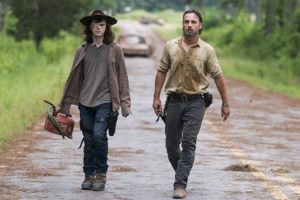 I think this is one of my favorite interactions between Carl and Rick of the whole series. I haven’t liked a lot of Chandler Riggs’ work as Carl, but this is right up there with Rick teaching him to farm at the prison, and Carl nursing Rick back from near death when the Governor destroys the prison and nearly kills Rick. During this discourse, Carl’s claim against his father is explored a little more. This is all in response to Rick saying he “hopes he makes it”, referring to Siddiq when they first encountered him. Carl tells him, “You don’t just hope, it’s gotta be more than that.” Carl is pulling Rick towards this place of mercy where hope overcomes vengeance and peace is attainable without wholesale bloodshed. But Rick only see the war…
I think this is one of my favorite interactions between Carl and Rick of the whole series. I haven’t liked a lot of Chandler Riggs’ work as Carl, but this is right up there with Rick teaching him to farm at the prison, and Carl nursing Rick back from near death when the Governor destroys the prison and nearly kills Rick. During this discourse, Carl’s claim against his father is explored a little more. This is all in response to Rick saying he “hopes he makes it”, referring to Siddiq when they first encountered him. Carl tells him, “You don’t just hope, it’s gotta be more than that.” Carl is pulling Rick towards this place of mercy where hope overcomes vengeance and peace is attainable without wholesale bloodshed. But Rick only see the war…
Carl: “Are we just going to kill them all?”
Rick: “What are we going to do, plant daisies with Negan?”
Carl: “Finding some way forward, that’s harder. That how it’s gotta be.”
Carl is concerned that his father has lost sight of why they’re fighting this war in the first place. The distinctions between them and the Saviors are crucial, but they’re easily glossed over and lost when violence and bloodshed become the primary focus. If Rick and his allies aren’t the type of people that can still bring someone in (like Siddiq) and continue moving toward building a civil society, then vengeance has overtaken their motives and they’re no better than the Saviors. This is a major hinge in the theme of this season, and Carl’s upcoming death via walker bite will only cause it to hit home sooner for Rick.
Elsewhere, another leader is dealing with very similar issues of mercy and vengeance. In the commotion caused by the Saviors escaping the Sanctuary and now visiting Alexandria and the Kingdom, Maggie and the Hilltop go on the offense to try and regain the upper hand. Unfortunately they’re stopped by a familiar road block (callback to Last Day on Earth), as Simon and the Saviors take them by surprise and give Maggie an ultimatum, holding Jerry’s life in the balance. To show he is serious, Simon shoots and kills one of Maggie’s passengers. Maggie gives in, and upon arriving back at Hilltop she brings one of their Savior captives out of the pen and executes him. She then sends him to the Saviors in a casket, demanding that they stand down otherwise she’ll execute the rest of the hostages. She’s making exactly the kind of decision that crumbles the differences between them and the Saviors. But there is more to this that is disturbing besides just what happened on the show.
On Talking Dead, a poll question was raised about whether Maggie made the right call. Host Chris Hardwick phrased it exactly this way; “Was Maggie right, should it be an eye for an eye?” Bible readers know well where that phrase comes from. It’s taken loosely from Leviticus 24, wherein the law 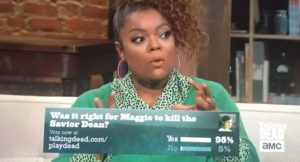 governing the punishment for harm one brings to another is described. Jesus, in the sermon on the mount, also used this phrase in his teaching about the true meaning and intent of the Old law. Nevertheless, the phrase “eye for an eye” is used generally by unbelievers to draw a distinction between a vengeful and hateful God of the Old Testament, and a God of mercy in the New Testament. I of course do not agree with the separation created here, but let’s run with it for just a moment. The secular world points at the Old Testament and calls this God hateful, spiteful, bigoted, vengeful… exactly the kind of God that loves “an eye for an eye” and leaves no room for mercy. So I thought it was incredibly interesting when 95% of the audience agreed with the notion that Maggie was right in dealing out vengeful, merciless, eye for an eye type of justice in this episode. So we’re in a place where people will find fault with God for a thing they allege to be unjust, but audiences will overwhelming agree when a person does a thing they believe to be the same (calling both “eye for an eye”). Perhaps people level these complaints at God because they’re all too familiar with this mindset and they’re finding fault with the image in the mirror moreso than the image of the creator.
governing the punishment for harm one brings to another is described. Jesus, in the sermon on the mount, also used this phrase in his teaching about the true meaning and intent of the Old law. Nevertheless, the phrase “eye for an eye” is used generally by unbelievers to draw a distinction between a vengeful and hateful God of the Old Testament, and a God of mercy in the New Testament. I of course do not agree with the separation created here, but let’s run with it for just a moment. The secular world points at the Old Testament and calls this God hateful, spiteful, bigoted, vengeful… exactly the kind of God that loves “an eye for an eye” and leaves no room for mercy. So I thought it was incredibly interesting when 95% of the audience agreed with the notion that Maggie was right in dealing out vengeful, merciless, eye for an eye type of justice in this episode. So we’re in a place where people will find fault with God for a thing they allege to be unjust, but audiences will overwhelming agree when a person does a thing they believe to be the same (calling both “eye for an eye”). Perhaps people level these complaints at God because they’re all too familiar with this mindset and they’re finding fault with the image in the mirror moreso than the image of the creator.
We got a small bit of closure on Eugene’s mindset which was so heavily dealt with in the previous episode. He still can’t sleep, and now even liquor isn’t making it easier. His conscious is tormenting him as he continues to help Negan destroy his “traveling companions.” What’s interesting from a Christian, or at least a philosophical perspective is Eugene’s beliefs on where that torment comes from. In the previous episode, Eugene and Gabriel minced words over the nature of Eugene’s actions; whether they’re right or wrong. Gabriel tried to convict Eugene of the error of his decisions, but Eugene insisted that because it keeps him safe, and because he is the determiner of the rightness or wrongness of his actions, it’s perfectly fine. In other words, Eugene is espousing a subjective (relative) morality, whereas Gabriel is taking the Christian stance that morals are objectively right and wrong. In this episode, Eugene returned to free Gabriel and the doctor, while dropping some not so subtle clues as to how to escape. As Eugene begins to leave, we get this exchange…
Gabriel: What you’re doing is right.
Eugene: As previously discussed that nature of that topic is relative.
Gabriel: No. It’s not.
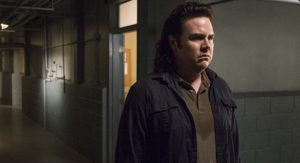 Eugene meets Gabriel’s retort with a long pause, then he leaves. The implication is that his own actions, and better yet his own tormented conscious, expose his subjective morality as false. If the moral quality of an act is determined by the subject, then Eugene had no cause for torment. As it was, he could not avoid how he felt, and that feeling comes from somewhere. An atheist humanist would argue it comes from the relationships formed with the people he was betraying, but that necessitates relationship to be pre-existent for the mistreatment of others to be seen as wrong. The Christian perspective argues that all people, being created in the image of God, have an ingrained morality that convicts us of what is right and wrong whether we know the people we’re mistreating or not. This, I believe, is the source of Eugene’s torment.
Eugene meets Gabriel’s retort with a long pause, then he leaves. The implication is that his own actions, and better yet his own tormented conscious, expose his subjective morality as false. If the moral quality of an act is determined by the subject, then Eugene had no cause for torment. As it was, he could not avoid how he felt, and that feeling comes from somewhere. An atheist humanist would argue it comes from the relationships formed with the people he was betraying, but that necessitates relationship to be pre-existent for the mistreatment of others to be seen as wrong. The Christian perspective argues that all people, being created in the image of God, have an ingrained morality that convicts us of what is right and wrong whether we know the people we’re mistreating or not. This, I believe, is the source of Eugene’s torment.
Finally, some other items in this 90-minute episode weren’t so thematically driven, but deserve comment none-the-less.
- Recall, if you will, the reason for Glenn’s death. Daryl acted out of rage and Negan responded by killing Glenn. Now, how did the Saviors escape? We don’t really know for sure. A couple times it’s mentioned that Eugene came up with the plan. But that doesn’t quite calm Daryl’s curiosity. It’s possible, perhaps even likely, that Daryl’s knee-jerk decision to ram the complex and let the walkers in is exactly what spurred the Savior’s ability to escape and kill his friends, just as his knee-jerk reaction got Glenn killed. Until we know more, Daryl will be living with that on his conscience.
- Aaron and Enid embark on a trip to Oceanside to request their assistance. It’s not clear whether this is part of the plan from the beginning, or if Aaron decided on his own to do this after Eric’s death for it to mean something more, and Enid decided to tag along. Whatever the case may be, Enid ended up killing Grandma as she stood over Aaron ready to hit (kill?) him. She may have ruined any hope they have of gaining that group’s trust.
- Ezekiel finally stopped sulking and helped free his people once the Saviors came threatening them and demanding Ezekiel be turned over. A nice line from Ezekiel, as Carol pleaded with him to come with them, was “save them like you saved me.” Negan wants to make an example of Rick, Maggie and Ezekiel. Specifically, he wants their heads on a pike as a warning to others. As of now Ezekiel is the only one they have captive, but it looks like Morgan may have something to say about that.
- Rick and the small group with Daryl, including Dwight, somehow make it into Alexandria (because darkness and smoke) and into the storm sewers without being detected. Rick discovers many Alexandrians safe down there, thanks the Carl, who he also found had been bitten. Presumably this happened when Carl and Siddiq fought of a few walkers on the way to get Siddiq to safety. Carl has maybe a day or two left as the remainder of the group decides what to do now.
My Rating: A
 This is a very good midseason finale in my book. There was a lot of depth to wade through in matters like what Eugene was dealing with. There was some excellent contrast in theme present between Carl and Maggie’s actions. We had a couple very interesting character points between Daryl and Ezekiel, not to mention Michonne getting back to her sword-wielding roots and Dwight’s betrayal being uncovered. Throw in plenty of well executed action and the destruction of Alexandria and this episode just about has it all. The decision to kill Carl is/will be a major departure from the graphic novels. He is still alive in the novel, which is years after the events the show is currently covering. But the way he dies here is very well executed, in my opinion. He sustains a walker bite while helping Siddiq come to Alexandria, which is the action that represents the type of hope he’s criticizing his father for not having. He is both a picture of what hope can lead to in this world, while also a symbol of what Rick and others should strive toward. Carl’s death can, and hopefully will be, a rallying moment for Rick and the group to maintain the hope that distinguishes them from the Saviors.
This is a very good midseason finale in my book. There was a lot of depth to wade through in matters like what Eugene was dealing with. There was some excellent contrast in theme present between Carl and Maggie’s actions. We had a couple very interesting character points between Daryl and Ezekiel, not to mention Michonne getting back to her sword-wielding roots and Dwight’s betrayal being uncovered. Throw in plenty of well executed action and the destruction of Alexandria and this episode just about has it all. The decision to kill Carl is/will be a major departure from the graphic novels. He is still alive in the novel, which is years after the events the show is currently covering. But the way he dies here is very well executed, in my opinion. He sustains a walker bite while helping Siddiq come to Alexandria, which is the action that represents the type of hope he’s criticizing his father for not having. He is both a picture of what hope can lead to in this world, while also a symbol of what Rick and others should strive toward. Carl’s death can, and hopefully will be, a rallying moment for Rick and the group to maintain the hope that distinguishes them from the Saviors.


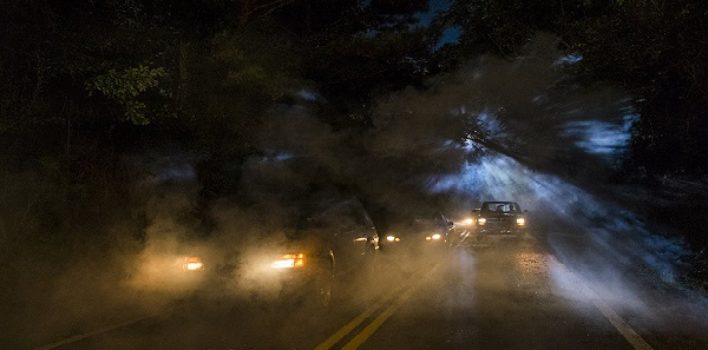

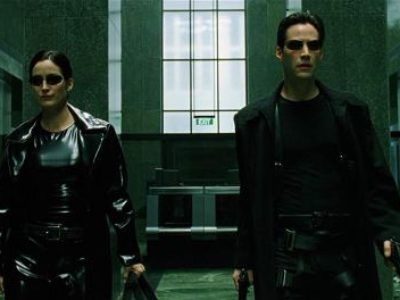
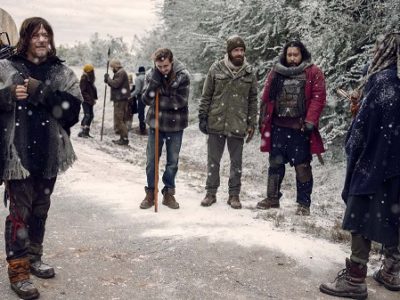


Pingback: Reel World Theology